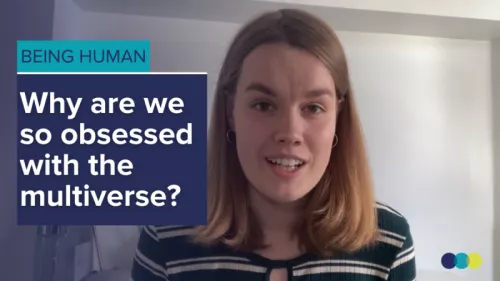I wonder how much time we spend daydreaming about alternative realities. Perhaps a road not taken – what if I took that job I was offered a few years ago? Moved to that city? Where would I be now? Or in a different life, if my circumstances looked different, I could be anything – a chef, diplomat or famous singer. Interestingly, at the moment, pop culture is also fascinated by alternative realities, and this is particularly true for cinema’s latest obsession: the multiverse.
The what? Now, if any of you just rolled your eyes and began to click away for fear of science fiction nonsense, I encourage you to stick with me.
The multiverse
Two major films have graced our cinema screens this month. First, the latest addition to the Marvel Cinematic Universe, Doctor Strange and the Multiverse of Madness, which takes superhero-ing to a whole new level as Doctor Strange jumps across universes to protect his reality from the villainous Scarlet Witch. At the same time, Everything Everywhere All at Once also premiered this month, which centers around Evelyn Wang, a laundromat owner who discovers there are hundreds of versions of herself existing across different realities.
And these two editions are just the latest pieces of pop culture to recently dive into the concept of the multiverse, which suggests that there are many universes existing parallel to each other, and that these alternate timelines of earth may differ from ours in small or seismic ways. Although this concept has been explored through film for decades, it seems to be having a resurgence. So, my question is: why are we all so obsessed?
The ‘if onlys’ and ‘what ifs’
Cynically, but realistically, the multiverse makes big money. As box-office gold, I’m sure the idea will increasingly become commonplace for entertainment more widely. Multiverse storytelling allows for the resurfacing of long-gone beloved characters, rewritten history and an ability to play with entirely new rules for the imagination. It paves the way for endless sequels and spin-offs. And clearly, the dollar signs indicate audiences love it.
However, taking my cynical hat off for a moment and replacing it with a philosophical one. Is there a deeper reason as to why audiences are so attracted to the idea of multiple universes and realities?
Despite the strong sci-fi undertones, there is a relatability to it. It strikes a chord with a feeling that bubbles away in our secular society today – a nihilism that still wants meaning. In Everything Everywhere, the main antagonist of the film becomes so overwhelmed at the sight of millions of realities that she concludes that nothing really matters. With infinite possibilities, everything is pointless. However, things do matter. And in both Doctor Strange and Everything Everywhere, despite being exposed to their insignificance, the main characters still want to save the day, be united with their loved ones and grapple with the meaning of it all.
"It strikes a chord with a feeling that bubbles away in our secular society today – a nihilism that still wants meaning."
In a post-secular society that rejects religion, there is a resurgence of spirituality, a questioning of life. And ultimately, the idea of the multiverse speaks to the ‘what if…’ questions, from: what if there was never an outbreak of coronavirus? What if we voted to remain in the EU? What if Trump never won the 2016 presidential election? To the more personal, ‘if only…’ questions: if only I had more money, I was funnier, more beautiful, more successful. And, asked profoundly by the Scarlet Witch in Doctor Strange: “If you knew there was a universe where you were happy, wouldn’t you want to go there?”
Storytelling the gospel
So, what does this mean for us today as followers of Jesus? In a society that has mostly rejected the idea of God and is suspicious of the gospel, there remains a search for meaning and transcendence. Therefore, let’s learn a thing or two from the likes of Hollywood filmmakers and artists – let’s tell a captivating story. One that prompts the deeper questions of meaning and significance. A story that engages people where they are at but wants to be taken further.
Thankfully, we don’t need to commission scriptwriters, cinematographers and directors, for we already have a good, true and beautiful story found in the pages of scripture. We just sometimes struggle to tell it. And the drama of this story is one that not only connects with the meaning and mystery of life, but simultaneously invites us to be participators, not consumers, of God’s unfolding restoration. A story where the ‘what if’ and ‘if only’ questions are met by a God who welcomes us into his reality, not a fictional alternative one, but a reality where purpose, value and dignity are freely given. As a church, let’s be attentive to the cries of our culture – watch films, listen to music, read the news – to understand and empathise with the big questions people are asking today. But let’s not forget the story we have been given, and the power of creatively telling it and authentically living it.
"Thankfully, we don’t need to commission scriptwriters, cinematographers and directors, for we already have a good, true and beautiful story found in the pages of scripture. We just sometimes struggle to tell it."
Watch Emma’s quick take on the film industry’s love of the multiverse:




